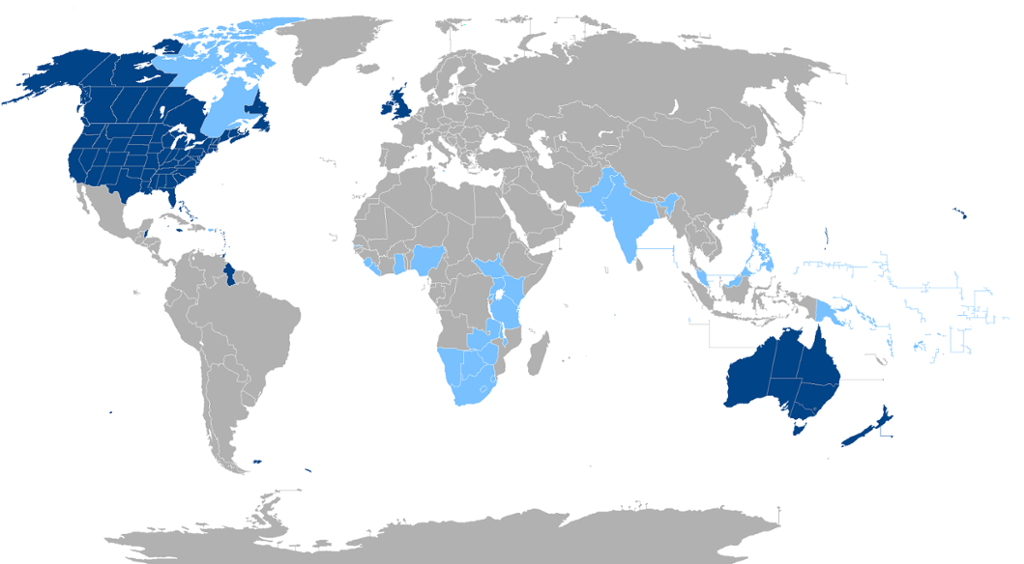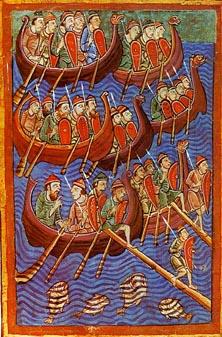Why So Much Variety in English?

Make sure you understand these words before you read the text. Use the dictionary in the link collection to look up new words:
Why So Much Variety in English
When you start listening to the examples of English we have prepared, you might ask yourself why there is so much variety in English. There's not just one answer.
Check out samples in our interactive map as you read:
When the Anglo-Saxons started their invasion of the British Isles around 449, we must remember that England didn't exist. Neither did Wales or Scotland. The whole island was occupied by Celtic tribes. The Anglo-Saxons, that is, Angles, Saxons and Jutes took advantage of the power vacuum created by the retreating Roman armies (about 410) and occupied most of what is now England. Distinct Germanic tribes occupied different parts of England. Each tribe spoke slightly different versions of a Germanic language, so right from the very beginning there were several varieties of English.

When the Vikings invaded North-East England and the Midlands around the end of the eighth century, they brought with them their version of a common Germanic tongue and contributed to even more variety in English. The descendants of this Northern Germanic language can now be heard throughout Scandinavia. Although the Scandinavian invaders were victorious, in the end they adopted the Anglo-Saxon variety of Germanic. However, although we have no record of how people spoke, the English in the area occupied by the descendants of the Vikings, the Danelaw, probably had its own distinctive sound. The division of England in that period probably contributed to the fact that there is a clear distinction between southern English and northern English. The further north we go, the greater the difference from the accents of the South. You might notice that the accents of Newcastle in northern England and Glasgow in Scotland are similar; they even share some vocabulary. (Compare these accents when you listen to our examples.) This demonstrates the fact that languages know no frontiers. The accent situation in the UK is typical of many languages; the accents geographically furthest apart are the least similar while those closer to each other are often very similar.
With the Norman Conquest in 1066, the differences between North and South became even greater and dialects started to flourish throughout England. English was no longer the language used at Court and the possible standardizing influence that this English may have had disappeared.
An important factor in language variation is the existence of a substrate language. The English accent in Wales has probably been influenced by Welsh. (Listen to our examples.) The same occurs in the Republic of Ireland (also in the Highlands and Islands of Scotland) where the Celtic substrate has exercised its influence on vocabulary, syntax and accent. (Some of these aspects can be heard in our example.) The accent of Northern Ireland, however, has nothing to do with a Celtic substrate. The reason is that many of the inhabitants of Northern Ireland came from Scotland, thus the name Scots Irish for the variety of English spoken there. If you compare our examples of Glasgow and Belfast English you will see that the accents of Northern Ireland and the Lowlands of Scotland are quite similar.
In spite of the development and spread of Received Pronunciation (RP) and Standard English together with the unifying influence of television and radio, regional and city accents are as strong as ever, in many cases because they are a sign of geographical or social identity as in the case of Newcastle, Liverpool, Cornish English, and Cockney, all of which are included in our overview of varieties of English.
In the early 1700s, English was already present in Virginia and New England. By the time the rest of the United States had been settled, different accents could be heard throughout this vast country and neighbouring Canada. We know that different areas of the United States were occupied by people from different parts of the British Isles. In New England the accent owes a lot to that of South-East England where there is no post-vocalic "r", so people pronounce words like car without a final "r". General American pronunciation (see example), however, is characterised by the post-vocalic “r”, probably due to the influence of the rhotic accents of England (like our example from Cornwall), and also Ireland and Scotland. The non-rhotic southern American accent, of which we have an example from North Carolina, owes its beginnings to settlers from the South of England, where post-vocalic “r” had disappeared or was in the process of disappearing. So just as in the case of the beginnings of English in England, regional variety was largely due to the origin of the people who settled in different areas of the United States.
English also spread to Jamaica and Africa in the 17th century. Here the influence of African languages is notable. This led to the creation of pidgins and creoles (see Jamaican example) and the use of English as an official language alongside African languages (see Nigerian example).
In the late 18th century Australia and New Zealand were discovered. The accent of Australia owes a lot to the prisoners sent to the penal colonies in this country who mostly came from the London area.
During the 19th century the Indian subcontinent was colonised by the French and later by the English. Nowadays, English is an official language in both India and Pakistan. Once more, the English spoken in this vast area was influenced by the substrate languages. One of the characteristics of these accents of English is the presence of retroflex consonants from the languages of this region.
We hope you enjoy the journey through the varieties of English and that you learn to appreciate the diversity of a language to which people from all over the world have contributed.